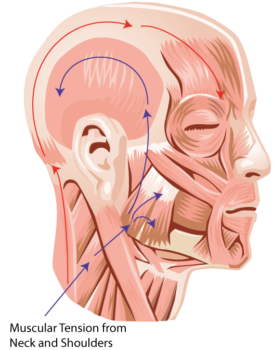Our body’s all processing our emotions differently. Some people dream, some people get upper back tension, many grind their teeth or develop a tight jaw. The jaw is has some of the strongest muscles in the body, so when it gets worked hard enough to get inflamed, knotted or fatigued, the pain can be quite debilitating. I myself have long suffered from jaw pain due to martial arts training, and am well aware of the  pain and headaches it can cause.
pain and headaches it can cause.
Many people when they become stressed can clench their jaws and not even be aware of it, many of use grind our teeth whilst we sleep, and only are made aware of it by a trip to the dentist. Why do we process stress in this way though?
Can Stress cause jaw pain and teeth grinding?
The causes of bruxism (teeth grinding) and jaw clenching are largely unknown, but stress is believed to be a common cause¹. When we become stressed our body and limbic system feels we are threatened. This causes a ‘fright or flight’ response, which results in our body’s going on the defence as we are feeling endangered. Part of this reflex action is we want to protect our vital areas such as our neck. This causes our jaws to tighten, our shoulders to raise to protect our neck and vital blood vessels (without us even realising it).
The problem with our ‘fright or flight’ response in modern life is that it doesn’t get a chance to end. Traditionally you’d see a danger, run to safety and your body would return to normal. It should last minutes at most. Modern life though doesn’t give us this escape, you can feel threatened at work for 8 hours straight, or at home etc. This causes the response to go much longer than it should and can result in the body needing to find ways to process all this excess stress we are carrying. This can lead to such problems as shoulder/neck pain, trouble sleeping, jaw clenching and teeth grinding whilst asleep.
Other than the direct damage to your teeth’s enamel, jaw clenching and grinding can cause tissue inflammation in your jaw, leading to pain and tendonitis. This is caused by the muscles being overworked and fatigued and not being able to contract/relax properly. This puts excess pressure on the tendons and ligaments where the muscles attach to your jaw and skull. This often can present as pain where your jaw bone articulates (TMJ), in the muscles themselves (Myofascial pain) headaches and even toothaches due to nerve compression.
Possible Muscular Causes of Jaw Pain (Myofascial Pain)
Obviously the other direct cause of jaw pain can be old impact injuries from sports or martial arts. Scar tissue can develop in any muscle, including the jaw, which can lead to chronic tension in the jaw muscles and then cause pain.
Chronic upper back tension I find is a common cause for jaw pain. As stated above, the stress response causes us to tighten up our upper back muscle to protect our neck, this can lead to chronic muscle soreness and tightness. What also then slowly happens is your small neck muscles become overworked and fatigued, which travels up your neck and can then begin irritating your jaw muscles. Although our jaw muscles are used to a heavy workload, every muscle has its limit.
When your masseter muscles become overly tight, they can pull and overwork your temporalis muscle which is attached to the side of your skull. This large fan shaped muscle has many blood vessels around it, so when this and other skull muscles become tight it can affect the vasculature of your head, causing, pain, dizziness and headaches.
How Acupuncture may help Ease TMJ and Myofascial Jaw Pain
Acupuncture is a known form of pain relief. As often these types of pain are caused by muscular tension, the goal of treatment is to help the muscle relax and return to their normal state. With the muscles being more relaxed and being able to function normally, they will reduce pressure on surrounding vessels and not cause pain from being overworked or fatigued. This may also help relieve associated symptoms such as headaches and dizziness, if they are being caused by muscular tension in the jaw. Often the inflammation can get quite severe and the tendons and ligaments of the muscles can also become quite painful. As these tissues only receive 10% blood flow by comparison to muscle tissue, it may take longer to see a result. The approach though is similar, by working to keep the muscle in a relaxed state, the body can go about better healing the damaged tissue.
I also incorporate stress relieving points and other distal points to help rebalance the underlying triggers which may be the causing the pain in your jaw and face from a Chinese Medicine perspective.
Currently there is medium quality scientific research showing Acupuncture’s efficiency for TMJ pain. A systematic review in 2017 concluded “Despite the weak scientific evidence supporting its efficacy, acupuncture treatment appears to relieve the signs and symptoms of pain in myofascial TMD. More controlled and randomized clinical trials with larger sample sizes are needed in this field of research to verify these initial findings.”

